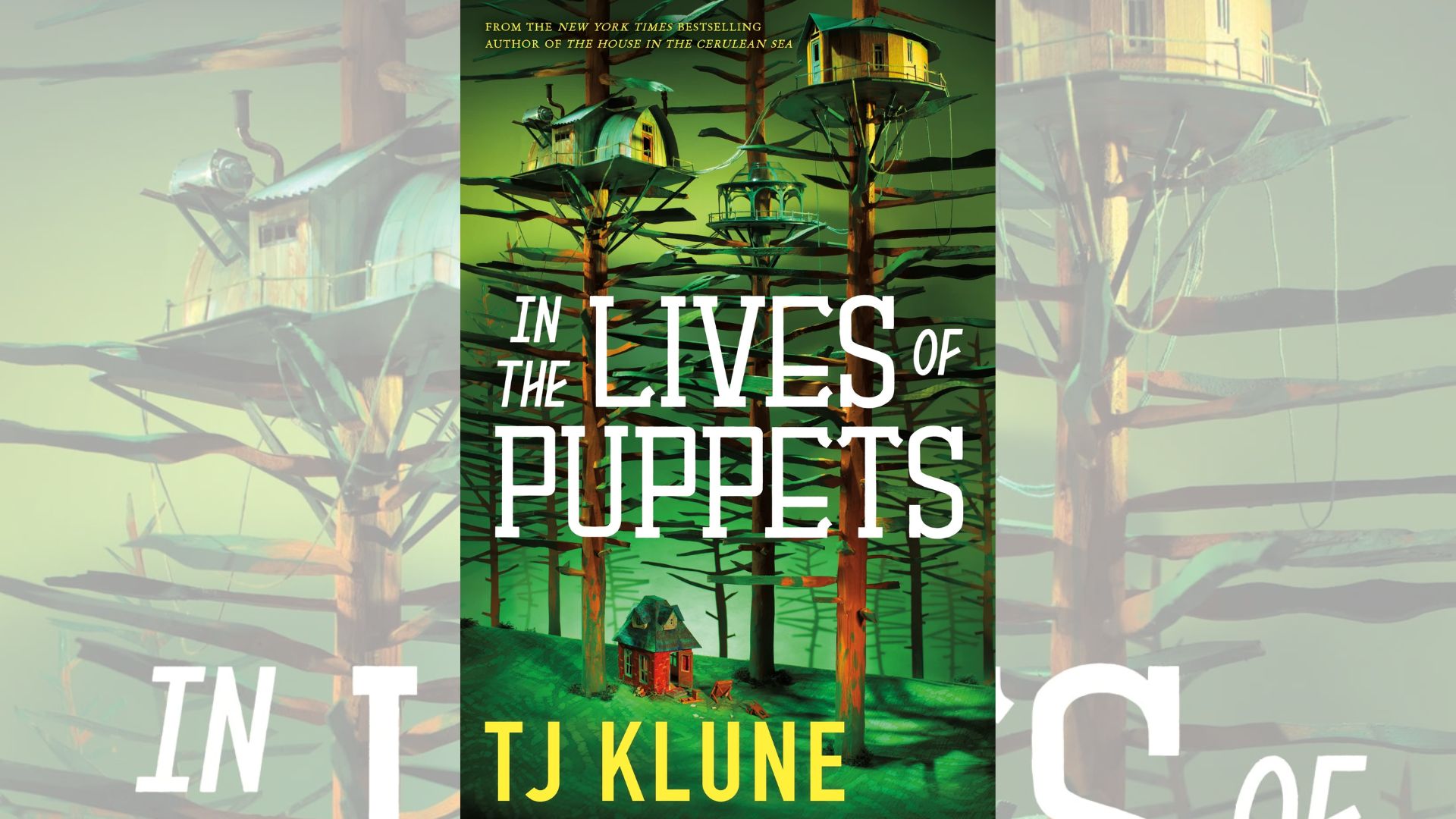In an old and lonely forest, far away from almost everything, sat a curious dwelling.
At the base of a grove of massive trees was a small, square building made of brick, overtaken by ivy and moss. Who it belonged to was anyone’s guess, but from the looks of it, it had been abandoned long ago. It wasn’t until a man named Giovanni Lawson (who wasn’t actually a man at all) came across it while making his way through the forest that it was remembered with any purpose.
He stood in front of his strange find, listening as the birds sang in the branches high above. “What’s this?” he asked. “Where did you come from?”
He went inside, passing carefully through the door hanging off its hinges. The windows were shattered. Grass and weeds grew up through the warped wooden floor. The roof had partially collapsed, and the sun shone through on a pile of leaves that almost reached the ceiling. At the top of the leaf pile, a golden flower had bloomed, stretching toward the sunlight streaming through the exposed rafters. “It’s perfect,” he said aloud, although he was very much alone. “Yes, this will do just fine. How strange. How wonderful.” Giovanni returned bright and early the next morning, his sleeves pushed up his forearms. He knocked down the walls inside the solitary building to create one large room, carrying plaster and wood out piece by piece and piling them on the forest floor. By the time he finished, his face and hair were coated with dust and his joints creaked and groaned, but he was satisfied. There was merit to hard work.
“There,” he said to the birds in the trees as he wiped his face. “Much better. A first step to a new beginning.”
The little building soon became a home for all manner of things: sheets of metal and lengths of wires and cords, batteries of all shapes and sizes, circuit boards and microchips in glass mason jars. Other jars held hundreds of seeds of various shapes, sizes, and colors. There were old music boxes that sang little songs that ached, and silent record players without any records. Televisions, both great and small, their screens dark. And books! So many books on a variety of topics from plant life to whaling, from animals of the forest to complex diagrams of nuclear cores. They lined the new floor-to-ceiling shelving he’d made from the remains of what he’d torn down.
It wasn’t until he placed the last book on the last shelf that he realized he himself had nowhere to stay. The room was too full. It wouldn’t take much to expand the building, adding a room or two. But Giovanni Lawson wasn’t one to take the easy route. He saw the world in complex shapes and designs, and when he looked up at the trees around him, he knew what he would do. He wouldn’t build outward.
He’d build upward. It took time, as these things do. Many years passed. It needed to be perfect. There was safety among the trees and away from the harsh, blinding lights and cacophony of the city he’d left behind. Up in the branches of the trees above the house, he constructed a new little building around the solid trunk of the tallest fir tree, the undisputed king of the forest. From there, he built several more rooms into the trees, all connected by rope bridges—a laboratory and a sunroom, the ceiling made of foggy and scratched glass, the floor of shining oak panels, and no walls. Later this sunroom would become something different. The forest was vast and wild. He doubted they’d ever be able to find him there. On sunny days, a herd of deer would graze on the grass below him, and the birds would sing above him. He hummed along with their song. Giovanni was at peace. At peace until the day his chest began to hurt.
“Oh my,” he said. “What an interesting sensation. It burns.” In his lab he ran calculations. He typed on his keyboard, the clack, clack, clack echoing flatly around him. “I see,” he said on the fifty-second day after he’d first felt the ache in his chest. He stared at the screen, checking his numbers.
It was loneliness, pure and simple. Numbers never lied. Three more years went by. Three years of the ache in his chest only growing stronger. Three years of quiet, of longing to hear a voice aside from his own. He would look out the window of his laboratory to see that it was snowing, when just yesterday the forest had been caught in the throes of summer.
On a day that began no differently than all the ones that had come before, two people burst from the trees, their eyes wide in fright, their skin slick with sweat. A man and a woman. The woman clutched a bundle of rags against her chest. Giovanni startled.
“Help us!” the woman cried. “Please, you must take him. Take him and hide him away. It’s not safe.” And then she held out the bundle of rags. Except it wasn’t just rags. Swaddled tightly inside was a child. A boy who blinked slowly up at Giovanni before he scrunched up his face and cried. “What has happened?” Giovanni asked, looking back up at the woman in alarm. “Come, come. I will keep you safe. All of you.” But the woman shook her head.
“They will find us.” Tears trickled down her cheeks as she stepped forward, kissing the baby on the forehead. “I love you. I’ll return when I’m able.” The man said, “Hurry. They’re coming.” The woman laughed bitterly. “I know. I know. They always do, in the end.”
The man grabbed her by the hand and pulled her away, away, away. “Wait!” Giovanni called after them. “His name!” But they were gone. He never saw anyone else. No one ever came looking for the man and the woman. Or the child. And he never saw the man and woman again. Later, much later when the boy was grown, Giovanni would tell the boy that the woman—his mother—hadn’t wanted to leave him.
“She will come back,” Giovanni would tell him. “One day, when all is well, she will return.” Until then, he had desired a child, and now here one was. Oh, how fortuitous! How wonderful!
Giovanni took his time in deciding a designation for the baby. It was when the leaves were changing from green to red and gold that he found the perfect one. “Victor,” he told his son. “Your name shall be Victor. Victor Lawson. What do you think?” The loneliness he’d felt—massive and profound—was chased away as if it’d never existed at all. Giovanni worried when Victor grew and grew and grew, but still didn’t speak. He knew Victor listened to him when he spoke, could see the way the boy understood. “Is there a fault in your coding?” Giovanni asked him when the boy was four years old. “Did I make a mistake?” Victor didn’t respond. Instead, he lifted his arms, opening and closing his hands, his little fingers tapping against his palms. Giovanni did as he was asked. He lifted Victor, hugging him gently against his chest. Victor made a small noise that Giovanni took as happiness, his small face pressed against the man’s chest. “No,” Giovanni said. “You are as you’re supposed to be. I shouldn’t have questioned that. If there was ever perfection in this world, it would be you.” His chest ached once more, but it was for entirely different reasons. Giovanni didn’t need to calculate what he felt now. He knew what it was.
It was love.
[Excerpted from In the Lives of Puppets by TJ Klune, published by Pan Macmillan.]
The views expressed in this article are the author’s own and do not necessarily reflect Fair Observer’s editorial policy.
Support Fair Observer
We rely on your support for our independence, diversity and quality.
For more than 10 years, Fair Observer has been free, fair and independent. No billionaire owns us, no advertisers control us. We are a reader-supported nonprofit. Unlike many other publications, we keep our content free for readers regardless of where they live or whether they can afford to pay. We have no paywalls and no ads.
In the post-truth era of fake news, echo chambers and filter bubbles, we publish a plurality of perspectives from around the world. Anyone can publish with us, but everyone goes through a rigorous editorial process. So, you get fact-checked, well-reasoned content instead of noise.
We publish 2,500+ voices from 90+ countries. We also conduct education and training programs
on subjects ranging from digital media and journalism to writing and critical thinking. This
doesn’t come cheap. Servers, editors, trainers and web developers cost
money.
Please consider supporting us on a regular basis as a recurring donor or a
sustaining member.
Will you support FO’s journalism?
We rely on your support for our independence, diversity and quality.






